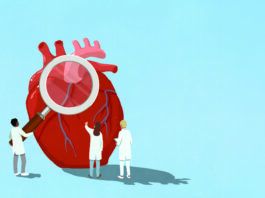Exercise and Vitamin D Rated Best Bets for Preventing Falls
A new review of more than 50 clinical trials, designed to update prevention recommendations for physicians, fnds exercise and vitamin D supplements are the most effective ways to prevent falls in older adults. The report says exercise was associated with a 13% reduction in the risk of falling, while trials of vitamin D supplementa- tion saw a 17% reduction in falls. The review will be used to update the US Preventive Services Task Force (USPSTF) recommendations for strate- gies to prevent falls.
Low-Fat Isnt Always Healthier, Nutrition Experts Caution
I f you want to eat a healthier diet, cut out the fat-right? Wrong, according to experts at the American Dietetic As- sociation (ADA) Food and Nutrition Conference and Expo, in a panel on The Great Fat Debate. If you replace dietary fat, even saturated fat such as butter and whole milk, with sugar and other carbohydrates, you could actually be increas- ing your risk of heart disease.
Drinking Tomato Juice Might Help Protect Your Bones
C ould a couple of glasses of tomato juice help you avoid osteoporosis? Thats the suggestion of a small new study at the University of Toronto that found lycopene-an an- tioxidant carotenoid that helps give tomatoes and some fruits their red color-reduces oxidative stress and bone resorption linked to osteoporosis.
Living Right Linked to Much Lower AMD Danger
T he healthy habits that protect your heart and combat chronic disease also seem to be good for your eyes. New research on a subset of the Womens Health Initiative (WHI) reports that women who eat right, exercise and dont smoke were 71% less likely to develop age-related macular degeneration (AMD), the leading cause of blindness among older Americans.
Echinacea Relieves Colds Only a Little
I f youve got the sniffes, echinacea probably wont help much, accord- ing to the latest randomized, controlled trial to report disappointing results from the popular herbal remedy. Uni- versity of Wisconsin researchers divided 719 cold sufferers into four groups: One group got echinacea (10.2 grams the frst day and 5.1 grams for 4 ad- ditional days) without being told about the treatment, a second group knew they were getting the herb, a third got a placebo and a fourth got nothing. Du- ration of symptoms ranged from 6.34 days in the blinded echinacea group to 7.03 days in the no-treatment group, with almost no difference between the unblended echinacea group (6.76) and the placebo group (6.87). Investigators found no statistically signifcant differ- ence in secondary outcomes, including infection markers and various self-re- ported symptoms. Although echinacea was associated with about a half-day beneft trend and 10% reduction in overall severity, researchers said only about one in four people would see relief likely to be worth the expense and effort of taking the herb. These re- sults, they concluded, do not support the ability of this dose of the echinacea formulation to substantively change the course of the common cold.
FTC Reins in Probiotic Yogurt Claims
The Federal Trade Commission (FTC), which regulates product advertising, will impose strict new limits on claims for Dannon probiotic yogurt products as part of a $21 mil- lion settlement of an investigation into the companys marketing. Dannon, however, insists the settlement means business as usual, stating, Our claims remain intact. The agreement with the FTC states that Activia, a spoonable yogurt touting digestive health benefts, can only claim to relieve temporary irregularity or help with slow intestinal transit time if it also states that three daily servings are required for this ben- eft. And Dannon, which has marketed its drinkable yogurt DanActiv as an immune-system booster, must not claim that any yogurt, dairy drink or probi- otic food or drink reduces the likelihood of getting a cold or the fu, unless the claim is approved by the Food and Drug Administration. The company insisted it had never made such claims. FTC Chairman Jon Leibowitz commented, These types of misleading claims are enough to give consumers indigestion.
Saccharin off EPA Toxic List
I f you remember the great saccharin scare of the late 1970s, it may come as a sweet surprise to learn that the US Environmental Protection Agency (EPA) has removed the artifcial sweetener from its list of hazard- ous substances. The switch clears the last offcial blemish from saccharins reputa- tion, with the FDA having given it an OK in 2000. Following studies linking saccharin with cancer in rats, the EPAs Carcinogen Assessment Group listed the sweetener as a possible human carcinogen in 1980. Now, in response to a petition from an artifcial- sweetener trade group, the agency has reversed that listing, saying theres insuffcient evidence that saccharin causes cancer in humans. Although not as popular in the US in part because of lingering can- cer fears, inexpensive saccharin remains the largest-volume artifcial sweetener in the world, primarily used in Asia.
Mental Energy-Boosting Claims Put to the Test
Can foods, beverages or dietary supplements really increase your mental energy? Scientists at the Life Sciences Research Organization (LSRO) recently reported the results of a review of the scientific evidence for such claims regarding ginkgo biloba, ginseng, glucose and omega-3 polyunsaturated fatty acids. They defined mental energy as consisting of mood (transient feelings about the presence of fatigue or energy), motivation (determination and enthusiasm) and cognition (sustained attention and vigilance)
Fiber from Grains Linked to Living Longer
Your mom was right about fiber being good for you-and not just because of its powers to aid digestion. A new analysis of nine years of data from the National Institutes of Health-AARP Diet and Health Study reports a link between dietary fiber and a reduced risk of death from cardiovascular, infectious and respiratory diseases, as well as a reduced risk of death from any cause
Zinc Benefits Nothing to Sneeze At
Zinc really might work to prevent the common cold and lessen the severity of symptoms, according to a new review, but the prevalence of side effects might make you think twice about taking it. Scientists searched for randomized, double-blind, placebo-controlled trials conducted since 1984

























